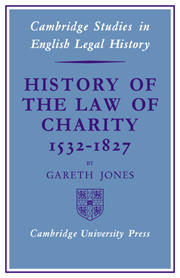Book contents
- Frontmatter
- Contents
- Preface
- List of Abbreviations
- Table Of Statutes
- Table Of Cases
- THE DEVELOPMENT OF THE LAW OF CHARITY 1532–1700
- I Introduction: Charity Before the Reformation
- II The Reformation and the Law of Charity
- III The Statutes of Charitable Uses: 39 Elizabeth I c. 6 and 43 Elizabeth I c. 4
- IV The Development of the Law of Charity, 1545–1700: A Definition of Charity
- V The Development of the Law of Charity, 1545–1700: The Privileges of Charity
- THE DEVELOPMENT OF THE LAW OF CHARITY 1700–1827
- Appendixes
- Index
V - The Development of the Law of Charity, 1545–1700: The Privileges of Charity
Published online by Cambridge University Press: 07 October 2011
- Frontmatter
- Contents
- Preface
- List of Abbreviations
- Table Of Statutes
- Table Of Cases
- THE DEVELOPMENT OF THE LAW OF CHARITY 1532–1700
- I Introduction: Charity Before the Reformation
- II The Reformation and the Law of Charity
- III The Statutes of Charitable Uses: 39 Elizabeth I c. 6 and 43 Elizabeth I c. 4
- IV The Development of the Law of Charity, 1545–1700: A Definition of Charity
- V The Development of the Law of Charity, 1545–1700: The Privileges of Charity
- THE DEVELOPMENT OF THE LAW OF CHARITY 1700–1827
- Appendixes
- Index
Summary
The privileges granted to the charitable use were varied and extensive and, during this period, were sympathetically interpreted by the Chancellor. ‘Le Commonwealth et le majesty divine, pur quel honor charitie est fait et commaund’, were anxious to ensure that philanthropy should be encouraged and that the objects of charitable trusts should not be frustrated by the formalism and rigidity of the common law.
The most influential of these privileges were the Chancellor's refusal to allow charitable trusts to fail because of a defect of form or the incapacity of the particular feoffees and his willingness to apply cy-preès to similar purposes, property held for a charitable object, which it was impossible or illegal to perform, or which would have failed at law for uncertainty. But there were other privileges, which equally vividly if more modestly, illustrate the Chancellor's concern to protect the endowment of godly and charitable uses. For example, no statute of limitation was allowed to bar any action to enforce a charitable use; charitable legacies were preferred on a marshalling of assets; and no charitable use was allowed to be destroyed by a tortious feoffment in fraud of the use.
Some of the privileges which will be described in this chapter find their origin in civil or canon law. The records suggest, however, that the Chancellor had adopted many of them as his own before the enactment of the Charitable Uses Act, 1601, although it was that statute, which was to lead to the confirmation and extension of the nascent Chancery development.
- Type
- Chapter
- Information
- History of the Law of Charity, 1532-1827 , pp. 59 - 102Publisher: Cambridge University PressPrint publication year: 1969



